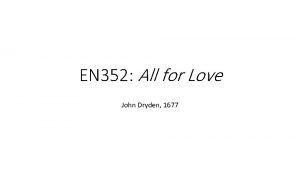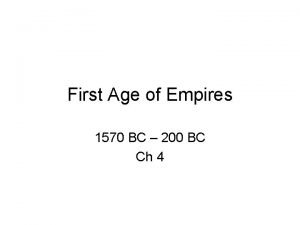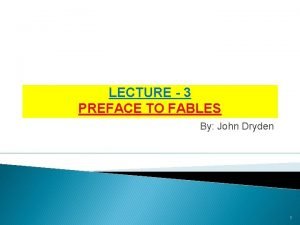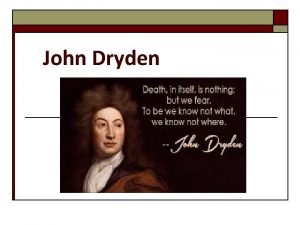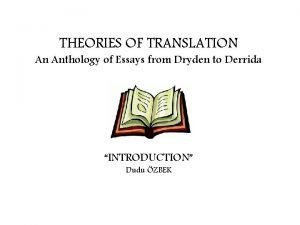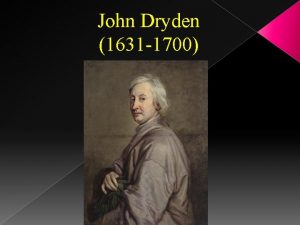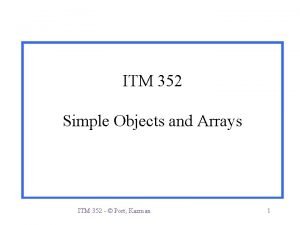EN 352 All for Love John Dryden 1677








- Slides: 8

EN 352: All for Love John Dryden, 1677

Heroic drama A name given to a form of tragedy (q. v. ) which had some vogue at the beginning of the Restoration period (q. v. ). It was drama in the epic mode – grand, rhetorical and declamatory; at its worst, bombastic. Its themes were love and honour and it was considerably influenced by French classical drama, especially by the work of Corneille. It was staged in a spectacular and operatic fashion, and in it one can detect the influences of opera, which at this time was establishing itself. The two main early works were by Sir William Davenant who was virtually the pioneer of English opera. His The Siege of Rhodes (1656) and The Spaniards in Peru (1658) helped to establish heroic drama. The main dramas thereafter were Robert Howard’s The Indian Queen (1665), Dryden’s The Indian Emperor (1665), The Conquest of Granada (1669– 70) and Aureng-Zebe (1675). Dryden was the best of the heroic dramatists. This kind of tragedy was satirized and burlesqued by Buckingham in The Rehearsal (1672), and much later again by Sheridan in The Critic (1779). See also burlesque.

Davenant on heroic poetry “That it ought to be dressed in more familiar and easy shape more fitted to the common actions and passions of human life and, in short, more like glass of nature, shewing us ourselves in our ordinary habits, and figuring more practicable virtue to us, than was done by the ancients or moderns. "

Petronius on the Gods In which sentence, and his own essay of poem, which immediately he gives you, it is thought he taxes Lucan, who followed too much the truth of history, crowded sentences together, was too full of points, and too often offered at somewhat which had more of the sting of an epigram, than of the dignity and state of an heroic poem. Lucan used not much the help of his heathen d

Hugh Blair, On Epic (1817)

Dryden on heroic poetry And if any man object the improbabilities of spirit appearing, or of palace raised by magic; I boldly answer him, that an heroic poet is not tied to bare representation of what is true, or exceeding probable; but that he may let himself loose to visionary objects, and to the representation of such things, as, depending not on sense, and therefore not to be comprehended by knowledge, may give him freer scope for imagination.

Dramatic Unities 1 Aristotle was the first to consider the problem of the dramatic unities of action, time and space, but he did not invent them. In Poetics (writing of action) he says: ‘The fable should be the imitation of one action, since it is the imitation of action, and of the whole of this, and that the parts of the transactions should be so arranged, that any one of them being transposed, or taken away, the whole would become different and changed. ’ Of time he writes: ‘Tragedy endeavours. . . to confine itself to one revolution of the sun, or but slightly to exceed this limit. ’ On space he is less explicit, merely saying (when contrasting epic and tragedy, qq. v. ) that tragedy should be confined to a narrow compass.

Dramatic Unities 2 In the 16 th and 17 th c. neoclassical critics of the drama in Italy and France required adherence to the unities. In all probability it was Jean Mairet (1604– 86) who established the doctrine of unities (though Ronsard and Jean de la Taille had made earlier statements) which French dramatists were to follow (almost unquestioningly) for two hundred years. Mairet’s play Sophonisbe (1634) was the first French play to conform strictly to the unity rules. The supporters of the Classical precepts required that a play should be a unified whole, that the time of action should be limited to twenty-four hours (though some allowed thirtysix) and that the scene should be unchanged (or at any rate confined to one town or city). These rules were largely ignorerd by English and Spanish dramatists – probably to the lasting gain of drama – though, oddly, the French called them les unités scaligériennes after Julius Caesar Scaliger, the eminent classical scholar, who had referred to them in Poetices Libri Septem (1561) when speaking of verisimilitude (q. v. ).
